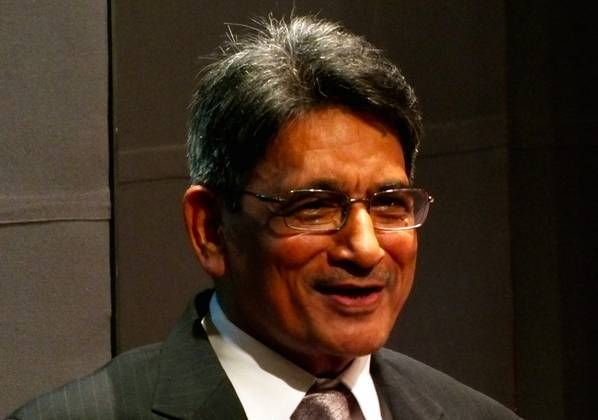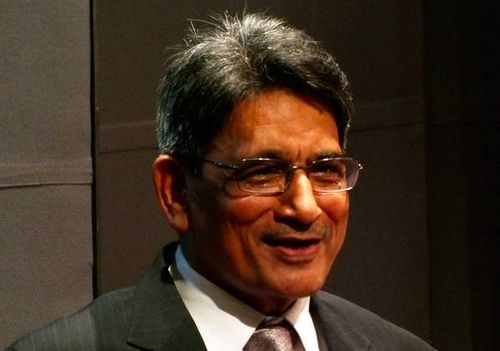
Lodha panel may have more on restructuring BCCI

The Supreme Court-appointed Justice Rajendra Mal Lodha Committee going into a whole gamut of issues involving the Indian cricket board has now confirmed that the president of the world's richest cricket body, Jagmohan Dalmiya, is ill and in no position to discharge his duties.
The three-judge committee, headed by former Supreme Court chief justice, reportedly wondered who is managing the affairs of the Board of Control for Cricket in India (BCCI) after finding Dalmiya's "speech incoherent and incomprehensible" when it met him in Kolkata on Tuesday.
The panel, which has already handed out a long questionnaire for the officials to reply, can now add another chapter to its report as to how the board is run without a full-time president.
It was mentioned in this column soon after his election in March expressing fears that an infirm Dalmiya doesn't seem too interested in the affairs of the board and that at 75, he is seeing the job as a perk at his age.
The first signs were visible when the usually feisty Dalmiya started sidestepping serious issues confronting the board, wanting to spend his tenure in peace without getting into any controversy or street-fights.
In the last three-odd months since he began his second innings as board president, all he is interested in is to see Sourav Ganguly and his son Abhishek are habilitated at the Cricket Association of Bengal (CAB). He also tried to make Ganguly the coach/director of the Indian team for a short stint.
Abhishek apparently is Dalmiya's spokesman, reading his father's mind for journalists. The Lodha panel members were surprised to find Dalmiya wanting his son to be by his side when he deposed before it in Kolkata on Tuesday.
The Supreme Court committee, set up on January 22, has two other retired judges of the apex court, Ashok Bhan and Raju Varadarajulu Raveendran, as its members. It was authorised to recommend the quantum of punishment for Chennai Super Kings team official Gurunath Meiyappan, son-in-law of Srinivasan, and Rajasthan Royals co-owner Raj Kundra for their involvement in betting in the 2013 Indian Premier League (IPL).
Simply put, Dalmiya is not a hands-on board chief now. He has allowed secretary Anurag Thakur to be the new power centre building a dominant cabal to back him.
Thakur contested as Sharad Pawar groupie for secretary's post and defeated Sanjay Patel, former president Narayanaswami Srinivasan's acolyte. Despite being barred by the Supreme Court from contesting, Srinivasan continued to pull strings.
How did Dalmiya get elected unopposed? Srinivasan's group backed him thinking he was the best bet to keep the seat warm for him. Srinivasan, his cohorts and his legal experts are confident that he would be absolved of all charges and if that happens he could stage a comeback. They see Dalmiya as a lame duck president.
It is quite an unusual arrangement as the board has invariably been headed by a powerful man and the president's position has never been a ceremonial one. Even when the Supreme Court appointed Sunil Gavaskar to manage the IPL affairs and his former teammate Shivlal Yadav to look after day-to-day working of the board in the wake of the IPL corruption case and the subsequent exiling of Srinivasan, the two derived enough power to wield, albeit for a short period.
It is whispered in the board circles that Arun Jaitley, who is seen as close to both Srinivasan and Dalmiya and a mentor to fellow Bharatiya Janata Party MP Thakur, is the de facto board chief. One factor that binds Jaitley and most board officials is that all of them are severely allergic to Lalit Modi, who seems to have sent shock waves through the spines of the ruling party leaders as well as the board officials with his daily doses of revelations in the social media.
Dalmiya is unlikely to travel and hence he may not attend any board meetings outside Kolkata and certainly not the International Cricket Council (ICC) meetings. Dalmiya has not gone to Barbados for the ICC annual meetings and India is being represented by Srinivasan and Thakur at the chief executives meeting. Srinivasan attending the meeting as ICC chairman is understandable but not as BCCI rep when he was barred by the apex court from contesting the election.
While these backdoor manoeuvres were going on, Pakistan board pulled off a master stroke by nominating one of the greatest batsmen of the modern era, Zaheer Abbas, to be the president of the apex body of world cricket for one year.
In the new arrangement, which gives India, Australia and England and Wales Board, pre-eminence in the ICC with the powerful chairmanship rotated among the three nations, the ICC president's post has become a ceremonial one.
Ironically, Srinivasan, who like all his predecessors kept the powerful among the former cricketers happy at home, bestowing on them well paid positions, lavished praise on Zaheer, calling him an icon and a worthy ambassador of the great game.
The Executive Board of the ICC must have informally decided to make former greats of cricket as presidents of the ICC. Even if it is a token gesture, it is a welcome step.
An Indian list of greats is already there, but how many of them will succeed Zaheer when India's turn comes on rotation!
(Veturi Srivatsa is a senior journalist. The views expressed are personal. He can be reached at v.srivatsa@ians.in)